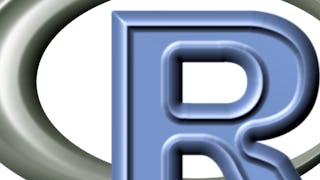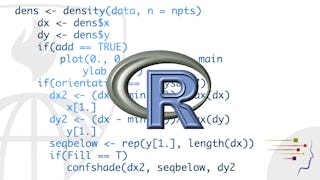This course covers advanced topics in R programming that are necessary for developing powerful, robust, and reusable data science tools. Topics covered include functional programming in R, robust error handling, object oriented programming, profiling and benchmarking, debugging, and proper design of functions. Upon completing this course you will be able to identify and abstract common data analysis tasks and to encapsulate them in user-facing functions. Because every data science environment encounters unique data challenges, there is always a need to develop custom software specific to your organization’s mission. You will also be able to define new data types in R and to develop a universe of functionality specific to those data types to enable cleaner execution of data science tasks and stronger reusability within a team.

Enjoy unlimited growth with a year of Coursera Plus for $199 (regularly $399). Save now.

Advanced R Programming
This course is part of Mastering Software Development in R Specialization


Instructors: Roger D. Peng, PhD
32,636 already enrolled
Included with
(575 reviews)
Skills you'll gain
Details to know

Add to your LinkedIn profile
See how employees at top companies are mastering in-demand skills

Build your subject-matter expertise
- Learn new concepts from industry experts
- Gain a foundational understanding of a subject or tool
- Develop job-relevant skills with hands-on projects
- Earn a shareable career certificate

There are 7 modules in this course
This course covers advanced topics in R programming that are necessary for developing powerful, robust, and reusable data science tools. Topics covered include functional programming in R, robust error handling, object oriented programming, profiling and benchmarking, debugging, and proper design of functions. Upon completing this course you will be able to identify and abstract common data analysis tasks and to encapsulate them in user-facing functions. Because every data science environment encounters unique data challenges, there is always a need to develop custom software specific to your organization’s mission. You will also be able to define new data types in R and to develop a universe of functionality specific to those data types to enable cleaner execution of data science tasks and stronger reusability within a team.
What's included
1 video3 readings
This module begins with control structures in R for controlling the logical flow of an R program. We then move on to functions, their role in R programming, and some guidelines for writing good functions.
What's included
17 readings
What's included
1 assignment1 programming assignment
Functional programming is a key aspect of R and is one of R's differentiating factors as a data analysis language. Understanding the concepts of functional programming will help you to become a better data science software developer. In addition, we cover error and exception handling in R for writing robust code.
What's included
19 readings
What's included
1 assignment1 programming assignment
Debugging tools are useful for analyzing your code when it exhibits unexpected behavior. We go through the various debugging tools in R and how they can be used to identify problems in code. Profiling tools allow you to see where your code spends its time and to optimize your code for maximum efficiency.
What's included
15 readings1 assignment
Object oriented programming allows you to define custom data types or classes and a set of functions for handling that data type in a way that you define. R has a three different methods for implementing object oriented programming and we will cover them in this section.
What's included
11 readings1 peer review
Earn a career certificate
Add this credential to your LinkedIn profile, resume, or CV. Share it on social media and in your performance review.
Instructors


Offered by
Explore more from Data Analysis
 Status: Free Trial
Status: Free TrialJohns Hopkins University
 Status: Free Trial
Status: Free Trial Status: Free Trial
Status: Free TrialJohns Hopkins University
Why people choose Coursera for their career




Learner reviews
575 reviews
- 5 stars
58.43%
- 4 stars
22.26%
- 3 stars
10.26%
- 2 stars
2.78%
- 1 star
6.26%
Showing 3 of 575
Reviewed on Dec 14, 2016
Good Course! But focus should be more on OOPs Concepts through video lectures to better understand it.
Reviewed on Jul 17, 2018
Excellent subject matter. 4 stars instead of 5 is only because there was no video. I love the videos in the other courses in this track, since I am an auditory learner.
Reviewed on Nov 28, 2019
Good course, nothing much to say, definitely teaches the use of R, not quite sure it is "advanced" but I guess...

Open new doors with Coursera Plus
Unlimited access to 10,000+ world-class courses, hands-on projects, and job-ready certificate programs - all included in your subscription
Advance your career with an online degree
Earn a degree from world-class universities - 100% online
Join over 3,400 global companies that choose Coursera for Business
Upskill your employees to excel in the digital economy
Frequently asked questions
To access the course materials, assignments and to earn a Certificate, you will need to purchase the Certificate experience when you enroll in a course. You can try a Free Trial instead, or apply for Financial Aid. The course may offer 'Full Course, No Certificate' instead. This option lets you see all course materials, submit required assessments, and get a final grade. This also means that you will not be able to purchase a Certificate experience.
When you enroll in the course, you get access to all of the courses in the Specialization, and you earn a certificate when you complete the work. Your electronic Certificate will be added to your Accomplishments page - from there, you can print your Certificate or add it to your LinkedIn profile.
Yes. In select learning programs, you can apply for financial aid or a scholarship if you can’t afford the enrollment fee. If fin aid or scholarship is available for your learning program selection, you’ll find a link to apply on the description page.
More questions
Financial aid available,
¹ Some assignments in this course are AI-graded. For these assignments, your data will be used in accordance with Coursera's Privacy Notice.


